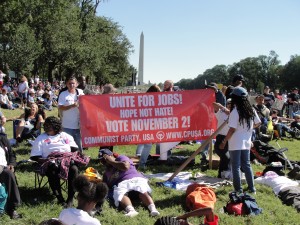By Zoltan Zigedy is available at:
http://zzs-blg.blogspot.com/
Workers’ Woes
Workers at a non-union Toyota plant in Kentucky have been offered incentives to retire early in order for management to replace them with new hires at a lower starting wage. The labor cost advantages formerly enjoyed by Toyota—the non-union premium—is no longer available to non-union plants in the auto industry. It seems the wages and benefits long ago won by a more aggressive UAW have retreated to the extent that non-union plants must now secure lower compensation in order to compete!
Since the UAW has conceded starting pay in the unionized industry down to about $14-16 per hour, Toyota seeks to replace older workers making around $26 per hour in their Kentucky plant with new hires at $16 per hour. Thus, the union shops are paradoxically pressuring the wages and benefits of non-union employees downward.
As reported in The Wall Street Journal, industry experts claim that the non-union manufacturers enjoyed a $29 an hour competitive advantage in wages and benefits as recently as 2008. By the end of 2011, they report that non-union labor costs were about equal with General Motors and actually higher than Chrysler!
It is hard to imagine a more demoralizing consequence for the union movement in the US: if only the market, and not a fighting union, is to competitively determine wages and benefits, how does one entice workers to join the union? For the bankrupt UAW leadership, union growth comes only from striking a deal with the employers– a deal that would promise collaboration and stability at the expense of workers’ pay and benefits.
The decimation of the living standards of US unionized auto workers came with the bailout and subsequent temporary stewardship of the auto industry by a Democratic Party administration. That same administration demanded plant closings and layoffs as a condition of the bailout.
With friends like these, workers are sadly in dire straights.
Clearly, radical changes are in order, changes that cry out for class struggle unionism and independent political action. Without a new direction, US workers will continue the descent towards Depression-era living standards.
Currency Wars
The 1917 text of Lenin’s Imperialism projected intense struggles between rival capitalist powers. Written during an unprecedented total war between the most economically advanced countries, a war that when settled cost the lives of millions of people, Lenin’s tract explained the First World War as a contest between empires seeking global advantage for the spoils of capitalist exploitation.
Less than twenty years later, the same empire-building forces were again unleashed to carve the world in a desperate attempt to secure markets and sources of strategic resources. World War Two further confirmed Lenin’s thesis that competing capitalist powers were unable to collaborate and cooperate for some greater, universal good. Instead, competition always begets aggression, national chauvinism, and war.
Many were dismissive of Lenin’s prophecies when witnessing the Cold War expediencies of inter-imperial cooperation against the emerging post-war socialist community. With well over a third of the world’s population in the socialist camp, the imperial rivals found a temporary basis of unity around fears and resistance to the success of socialist revolution. The survival of capitalism tamed the inherent rivalries for that moment.
The demise of that threat with the collapse of Eastern European socialism and the accommodation with capitalism by Asian Communists has unleashed the beast of imperial competition. The global economic crisis only serves to fuel the tensions and expose the rivalries.
I wrote in November of 2008 of the “global crackupâ€, noting that the US was no longer in a position to impose its will on the rest of the world, unable to slough its problems easily upon others. I drew attention to the logic of capitalist competition that, in the long run, denies any hope of cooperation and common solutions.
Today, that tendency— aggressive imperialist rivalry—has found its expression in a new war, a war waged around the relative value of national currencies.
Rulers understand that in a climate of stagnant or declining world trade, nation-states will draw an advantage from devaluing national currencies; by cheapening money—the medium of exchange— domestic enterprises will be able to offer their products at a more favorable price in international markets.
The US tepid “recovery†from the depths of the crisis has largely been won by hyper-exploitation of a docile work force and the dramatic expansion of exports through the Federal Reserve’s massive devaluation of the dollar via the printing press. The Qualitative Easing programs aim to suppress interest rates and remove the corporate garbage generated by the financial promiscuity of 2008-2009. But they also have the not-so-unintended consequence of bolstering the competitiveness of US export manufacturing.
At the same time, US policy makers pointed an accusatory finger at the Peoples’ Republic of China, charging its leaders with currency manipulation. While the charge got little traction from those who closely studied these relationships, it served as a useful diversion from US policies and bolstered rounds of anti-China bashing by do-nothing politicians and labor mis-leaders.
European Union leaders, occupied with the desperate effort to save the Euro, offered little resistance to US currency manipulation.
But with the election of Shinzo Abe in Japan, the currency war was joined. Abe, a right-wing nationalist, exploited the Japanese public’s frustration with years of ineffective governance and economic stagnation to scorn cooperation and offer an aggressive economic program geared towards restoring Japanese competitiveness. Assuming the office of Prime Minister, he launched an aggressive campaign to devalue the Yen. His pressure on the Bank of Japan has already (in less than two months!) produced a drop of 10% in the Yen’s value against the dollar and 15% against the Euro. This means that Japanese products are enjoying a growing competitive advantage in international markets.
International bankers see these moves clearly as the opening salvos in a major escalation of the currency/trade wars. Politicians in countries throughout the world have quietly made similar moves to spur competitiveness, but never with the open audacity shown by Abe.
Perhaps even more disturbing is the unabashed belligerence and arrogant nationalism accompanying these economic moves. The Japanese government has provoked disputes with nearly every Asian Pacific government over barren islands claimed as part of Greater Japan. Imperial aggression is as great a danger today as it was nearly a hundred years ago when Lenin established it as a structural feature of mature capitalism.
A Hushed Mea Culpa
Capital’s policeman, the International Monetary Fund, has offered a quiet confession of an arcane theoretical mistake of enormous consequence. As the leading cheerleader for decades of the “fiscal responsibility†approach to public programs, the IMF can take dubious credit for the policy of austerity as a general panacea for economic duress. A cursory look at the IMF legacy shows a constant, unrelenting enforcement of balanced budgets and meager public spending. Developing countries seeking IMF loans have felt the lash of austerity as a condition of relief.
A cornerstone of IMF thinking was a little discussed macro-economic assumption of the compounding effects of debt reduction. Where “unschooled†common sense might suggest that removing a dollar of public spending from economic activity would remove at least a dollar from a nation’s gross domestic product, the IMF postulated that it would reduce economic activity by only half of a dollar. That is, the “multiplier†for a reduction of public spending was only .5. The assumption, of course, is the neo-liberal axiom that the dollar spent elsewhere in the private sector MUST always be far more productive, must always be greater than unity and, therefore, must always outweigh the loss of “inefficient†public sector spending.
Unfortunately, the axiom is wrong. IMF empirical studies show that, in fact, the multiplier of public spending reductions ranges between .9 and 1.7. In other words, the negative impact of public spending cuts was underestimated by two to three times! The IMF confessed as much in its October report. Unstated, however, is the negative impact of this “error†on hundreds of thousands, perhaps millions, of people who have lost public benefits to the discipline of IMF imposed “fiscal responsibilityâ€. Even more have suffered from the constraint on economic growth produced by the regimen of austerity.
And yet debt reduction through choking government spending remains a priority of political parties from the far right to the social democratic left.
The Sky is Falling, but not on Everyone yet!
You would never know it from the Wall Street pundits loudly proclaiming the best January stock market in two years, but the US GDP shrank in the final quarter of 2012 (as it did in the UK, the EU, and even the seemingly bullet-proof German economy).
Generally, negative GDP panics investors and disrupts markets, but we live in special times. To the extent that labor remains quiescent and social movements fail to translate into anti-capitalist uprisings, investors and the capitalist class have made their peace with historically unacceptable unemployment and stagnating, but stable economic growth. It’s the earnings that catch the eye of the investors and the wealthy. And they have been holding up rather well so far.
In fact, they are creating the conditions for another round of risk-taking. Money market funds are flush with cash and seeking greater returns, securitization of debt is on the rise again (securities built on auto loans are greater than at any time since 2005), and banks are again growing their real-estate loan portfolios. Capitalism and the lust for ever greater accumulation never sleep!
Of course it is the very mechanism of accumulation, the search for yield on swelling capital (and the accompanying pressures on profitability), that announces the next round in the crisis.
Zoltan Zigedy
zoltanzigedy@gmail.com















